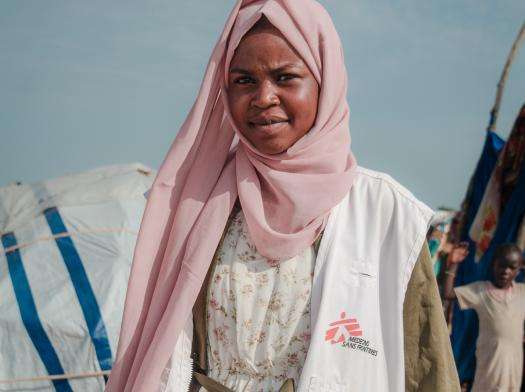The conflict in Sudan that broke out in April has forced more than 5.4 million people from their homes. While the majority are displaced within Sudan, over 1.1 million have fled to neighboring countries like Chad, South Sudan, and Central African Republic (CAR).
From the front lines in Khartoum and El Geneina to the refugee camps of South Sudan and the deserts of Chad, Doctors Without Borders/Médecins Sans Frontières (MSF) teams are caring for Sudan’s displaced wherever we find them. Along the Chad-Sudan border, our teams set up an inflatable hospital to accommodate large numbers of refugees fleeing El Geneina, South Darfur—an epicenter in the conflict—and to bolster the capacity of Adré hospital. In CAR, we vaccinated thousands of children upon arrival in anticipation of the disease outbreaks that often accompany the rainy season. In South Sudan, we’re assisting returnees struggling to access care in the very country they originally fled. And within Sudan, we’re operating in emergency rooms in hospitals and running clinics in camps like Um Rakuba.
Along the way, we have heard remarkable stories from people hailing from all corners of Sudan—including our own Sudanese colleagues. They share stories of targeted ethnic and gender-based violence; of people being displaced over and over again; and, above all, perseverance under some of the most extreme conditions imaginable. These are their stories, in their own words.
* Names changed to protect anonymity.

South Sudan 2023 © Evani Debone/MSF
Marta
“As soon as my children feel better, my husband will join us and we will continue our journey, maybe to Malakal. I will try to contact my extended family in South Sudan, but I am uncertain of the future. We would need a lot of courage to help survive during the coming difficult days to start a new life in South Sudan.”

Chad 2023 © Mohammad Ghannam/MSF

The same woman holds the bullet after it was extracted from her neck.
Chad 2023 © Mohammad Ghannam/MSF
Hawaya
"At first, we tried to survive and adapt to the security situation by moving around within El Geneina. [In June], my husband went out and we never saw him again. We no longer had anyone to protect and support us. Two days after his disappearance, I decided to leave for Chad with my children.”
Chad 2023 © Mohammad Ghannam/MSF
Chad 2023 © Mohammad Ghannam/MSF
Nasra
"I can't forget this scene of a mother with two children, they were all dead and piled on top of each other.”
Salim and Qamar*
“My children hid under the bed. The battle took place on the street directly opposite our house, with bombs raining down on the surrounding homes. The air was filled with the deafening noise of warplanes and explosions [...] To think, I had fled my own country due to war, only to face the possibility of death in the country where we had sought refuge.”

Sudan 2023 © MSF

Chad 2023 © Annie Thibault/MSF
Sijood
“We lost everything, we lost our people, our brothers, our sisters, we lost our money, we lost our house, we lost our country too. It’s very hard to say, but we must talk about this. I am a refugee. I live a difficult life, but now by the will of God, I will keep going."
Khalil*
“On June 25, I went out to the hills in northern El Geneina to try get some mobile signal. I saw at least 20 bodies when I looked down the valley, and I prayed to God to save me and enable me to join my family. I left on June 28, and at all the checkpoints, the driver said, ‘he’s one of us,’ and we were fine. Of course, I paid him a lot of money to say that, and many people didn’t make it to Chad and were killed just because they were Masalit [an ethnic group].”
Chad 2023 © Mohammad Ghannam/MSF

How you can help
Not everyone can treat patients in the field. But everyone can do something.
Some humanitarian crises make the headlines—others don’t. Unrestricted support from our donors allows us to mobilize quickly and efficiently to provide lifesaving medical care to the people who need it most, whether those needs are in the spotlight or not. And your donation is 100 percent tax-deductible.



